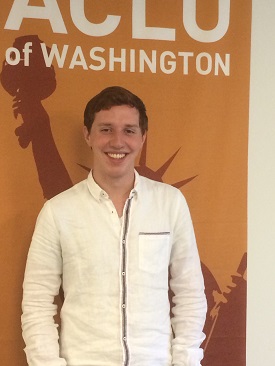Published:
Wednesday, August 5, 2015
Andrew Nelson has long sought justice and dignity for people working their way through the legal system. His first experience in the field was as a defense advocate in the Bellevue Youth Court, a youth-led juvenile diversion program in his hometown of Bellevue, WA. He worked closely with young people facing misdemeanor charges to explain their cases before a jury of youth peers and made recommendations for compromises with the best outcomes for all parties affected by the cases.
This experience launched him into an internship at the Vera Institute of Justice in New York City, where he researched LGBT youth experiences in the criminal justice system. Now a senior at Princeton University studying German literature and philosophy, Andrew has continued working in the justice system as a GED and college tutor at nearby youth correctional facilities.
“From the very beginning, justice system involvement bears on the rights, liberties and dignity of the individual. But that is often not the primary focus on the ground. I hope to restore dignity to the process wherever possible and make sure there is someone advocating for people caught up in the justice system,” he said.
This passion for protecting the rights of people in the legal system led Andrew to the ACLU of Washington, where he is a Policy Advocacy Group intern and is researching mental health policy.
In this year’s legislative session, the ACLU-WA lobbied against numerous bills that did not respect the rights of people experiencing mental illness. Now that the legislative session is finished, the ACLU is looking to be more proactive in the coming year. “We’ll be seeking to make policy recommendations that are good from both a civil rights and a public health standpoint. My research is going to support these efforts,” said Andrew.
When asked if there is a connection between his philosophy studies and mental health policy, Andrew jokes that data and research on mental health is immediately more useful to the ACLU than his philosophical thinking. However, he notes that the nature of the legal system is inherently linked to philosophy. One of the biggest intersections involves involuntary commitment and treatment.
“The ACLU is opposed to policies that make it easier commit someone and in the process deny them their dignity and their rights. But often, a person who is mentally ill does not realize the treatment that they need. Philosophically, this raises questions of how some rights may be contingent, withheld or restored,” he said.
Andrew also notes that many famous writers (and especially German writers) suffered from mental illness. Their works, he remarks, often suggest nuanced answers to these difficult philosophical questions. Outside of the ACLU, Andrew enjoys playing the saxophone and traveling with his friends.
This experience launched him into an internship at the Vera Institute of Justice in New York City, where he researched LGBT youth experiences in the criminal justice system. Now a senior at Princeton University studying German literature and philosophy, Andrew has continued working in the justice system as a GED and college tutor at nearby youth correctional facilities.
“From the very beginning, justice system involvement bears on the rights, liberties and dignity of the individual. But that is often not the primary focus on the ground. I hope to restore dignity to the process wherever possible and make sure there is someone advocating for people caught up in the justice system,” he said.
This passion for protecting the rights of people in the legal system led Andrew to the ACLU of Washington, where he is a Policy Advocacy Group intern and is researching mental health policy.
In this year’s legislative session, the ACLU-WA lobbied against numerous bills that did not respect the rights of people experiencing mental illness. Now that the legislative session is finished, the ACLU is looking to be more proactive in the coming year. “We’ll be seeking to make policy recommendations that are good from both a civil rights and a public health standpoint. My research is going to support these efforts,” said Andrew.
When asked if there is a connection between his philosophy studies and mental health policy, Andrew jokes that data and research on mental health is immediately more useful to the ACLU than his philosophical thinking. However, he notes that the nature of the legal system is inherently linked to philosophy. One of the biggest intersections involves involuntary commitment and treatment.
“The ACLU is opposed to policies that make it easier commit someone and in the process deny them their dignity and their rights. But often, a person who is mentally ill does not realize the treatment that they need. Philosophically, this raises questions of how some rights may be contingent, withheld or restored,” he said.
Andrew also notes that many famous writers (and especially German writers) suffered from mental illness. Their works, he remarks, often suggest nuanced answers to these difficult philosophical questions. Outside of the ACLU, Andrew enjoys playing the saxophone and traveling with his friends.




